
In December 2020, the IIJ convened its first national-level workshop under the auspices of the IIJ Juvenile Justice Initiative, at the request of Ethiopia. The First Ethiopia Online Workshop – Justice for Children in Terrorism Cases was delivered using a hybrid training model and is the first in a series of two tailored capacity-building workshops for high-level practitioners’ in Ethiopia. The workshop brought together 19 law enforcement officers, prosecutors, public defenders, judges, corrections officials and civil society actors working on the frontlines of juvenile justice. The main objective of the workshop was to brainstorm the challenges relating to the protection of children’s rights in a counter-terrorism context and to create a practical roadmap for achieving justice for children in Ethiopia. The training was designed around the framework of international norms and standards on children rights and the good practices articulated in the GCTF's Neuchâtel Memorandum on Good Practices for Juvenile Justice in a Counterterrorism Context.
The participating practitioners identified challenges in their country’s criminal justice system, including ensuring justice for juveniles in a country where approximately 70% of the population is under 25 years of age. Other challenges included the need for a comprehensive framework engaging all relevant stakeholders, the lack of early representation for young offenders, alternatives to incarceration, and infrastructure to support juvenile rehabilitation and reintegration.

The capacity-building and training addressed juvenile brain development and its effects on judgment and decision-making. Models and case studies from other countries were discussed, including Kenya’s model of promoting collaboration among practitioners and the Philippines’ community-based approach to child diversion with its high success rate, emphasising the importance of a multidisciplinary approach in handling juvenile counter-terrorism cases. This generated rigorous exchanges on relevant social support systems, eligibility for diversion, the use of a prior diversion record in a future case involving the same child, public awareness, and process institutionalisation. On rehabilitation and reintegration, participants shared perspectives on available programmes, including formal education, sports, recreational activities, arts programming and training in the garment industry.

On the final day of the workshop, the practitioners presented draft sector-specific recommendations and identified further challenges to address in the lead up to the second workshop to be held in March 2021. The draft recommendations will serve as the basis of a comprehensive, cross-sectoral framework engaging all relevant stakeholders involved in dealing with juvenile cases in Ethiopia. With this first workshop, much progress was made by the practitioners in identifying opportunities for significant and sustainable impact through the implementation of low-cost changes in current practices.
For more information on this workshop or the IIJ Juvenile Justice Initiative, please contact Programme Manager Emerson Cachon.
